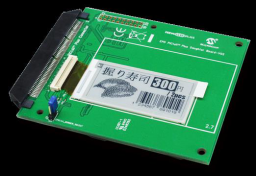Overview
E-paper EPD PICtail™ Plus Daughter Board is an extension board to the Microchip® Explorer 16 Development Board. EPD PICtail Plus Daughter Board is designed to kick-start e-paper development with Microchip Graphic Library and PIC Microcontrollers including PIC24, dsPIC33 and PIC32 families.
There is on board 40 pins FPC connector connects to our E Ink based EPD panels. The driving circuit supports driving 1.44 inch, 2 inch and 2.7 inch EPD panels via SPI interface. All three sizes of EPD ship with the EPD PICtail Plus Daughter Board. The sample Microchip MPLAB® X IDE project provides source driving waveform including global update and partial update with command interface to update content on EPD panel for developer to start working with EPD application easily.
NOTE: This PICtail Plus Board is not sold by Microchip. It is sold by Pervasive Displays.
Please visit the Pervasive Displays website for purchasing information.
- Supports driving 1.44", 2" and 2.7" EPD Panels including V110 and V230 FPL (Front Plane Laminate)
- Direct drive EPD by Microchip PIC24 microcontroller without extra graphic or timing controller
- On board 256K bits serial RAM and temperature sensor
- On board LDO voltage regulator to 3V for EPD operation
- PICtail Plus Interface for connecting to Explorer 16 Development Board
- Open documentation and driving waveform for EPD panel
- Provides Microchip MPLAB® X project source code with Microchip Graphic Library
- Provides global update and partial update driving technology on EPD panels
***Please visit this page to download the user's guide and software from Pervasive Display's website.
2.7 inch ePaper Panel
2 inch ePaper Panel
1.44 inch ePaper Panel
EPD PICtail Plus Daughter Board
Note: The Microchip Explorer 16 development board is required for use with this EPD PICtail Plus Daughter Board

Documentation
|
Title
|
Document Category
|
|||
|---|---|---|---|---|
| Epaper PICtail User's Guide, Design Files & Source Code | User Guide | Download |